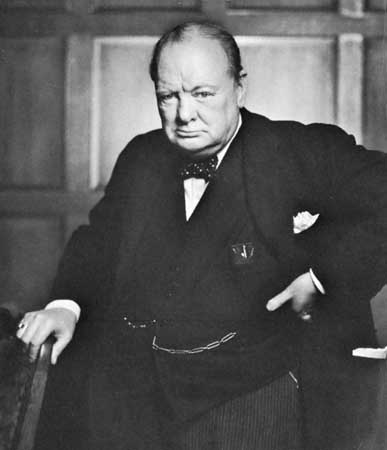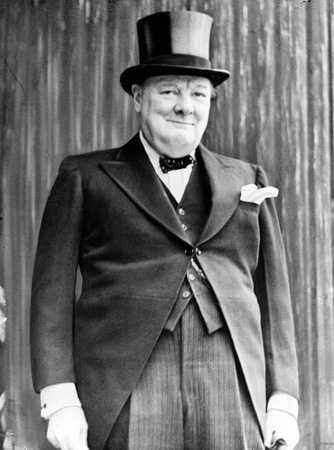 |
| Winston Churchill (Encyclopedia Britannica (photographed by Yousuf Karsh)) |
"A man does what he must- in spite of personal consequences spite of obstacles and dangers, and pressures- and that is the basis of all human morality" (Winston Churchill). This quote was stated by Winston Churchill and he matches the description of the values of man with accuracy. Born in 1874, Churchill became the Prime Minister of Great Britain. Since his death in 1965, he has always been remembered as a hero who defeated the cruel man, Hitler, from dictatorship. (Nicholas) A hero must attain the ability to lead others as well as possess determination and perseverance in order to make an impact on society. Since leadership encourages others to follow, how can one expect to create an impact on society without followers? Therefore, Winston Churchill represents determination and the ability to lead others in times of difficulty which make him a hero.
Churchill's positive attitude contributes to the qualities of a hero. He intended to update the citizens in Great Britain of the events throughout the war. "Here Churchill was in his element, in the firing line... smoking his cigar, giving his V-sign, or broadcasting frank reports to the nation, laced with touches of grim Churchillian humor and splashed with Churchillian rhetoric. The nation took him to its heart; he and they were one in 'their finest hour'" (Nicholas). Churchill expressed positivity and optimism through reports during the war. In addition to remaining dedicated towards the people in Great Britain, Churchill brought the country together through the use of humor. His humorous reports entertained and promoted unity. Also, Churchill refused to back down. "His stature remained high, even as Britain's war contribution paled beside that of the United States and Soviet Union." (International Encyclopedia of the Social Sciences). During the war Churchill presented a positive attitude and demonstrated pride even when Great Britain did not appear to be as involved as the U.S. and Russia. Although his manpower lied in the shadow of these countries, his perseverance and positive attitude showed in the spotlight. As a result, he became an influence and hero for others. Churchill's optimism led to the gaining of satisfaction and support from the people that propelled him forward as an inspirational hero.
After leading the country as Prime Minister during World War II, Churchill's leadership skills proved his ability as a role model. "Churchill regularly ventured out into the streets of London after (and sometimes during) air raids to tour bomb sites and offer moral support to the local residents. They in turn welcomed the man they affectionately called "Winnie" with warmth and cheers, marveling at his gallantry, unflagging optimism, and total lack of fear" (Contemporary Heroes and Heroines). By presenting speeches and refusing to back down, Churchill gave the people of Great Britain someone to look up to. Since citizens felt like they could relate to him, he became popular and a well known icon. Within his speeches, Churchill repeated the phrase "we shall" to persuade and encourage people to take action: "We shall go on to the end. We shall fight in France.we shall fight with growing confidence. we shall defend our island. we shall never surrender" (Winston Churchill). Churchill's strength and perseverance as a leader excited the citizens because he invoked a sense of patriotic pride in every listener. In order to fight for freedom, Churchill understands that he must lead the country and convince them that the power of Great Britain is worth fighting for. It is as though Churchill is speaking to each person individually by encouraging them to stand up and to take action. When Churchill repeats "we", he implies that Great Britain's success depends on the unity of the country and that everyone must contribute to the ongoing war effort. Clearly, Churchill reflects a hero that strived to persuade a country and consistently remained an admired icon.
 |
| Winston Churchill in London, England (Gale Biography in Context (AP Images)) |
Churchill's success derived from past accomplishments and recognitions. However, Churchill's attempt as a politician was not as impressive as his ability to lead while being Prime Minister. "In 1899, Churchill lost in his first attempt at election. he lost more elections than any other political figure in recent British history. But in 1900. "he served until 1964" (Encyclopedia of World Biography). Although these struggles affected Churchill, he still refused to give up. His mind was set on obtaining a role in the House of Commons and eventually his perseverance paid off. According to Professor Nicholas G Herbert, "it was obvious that Churchill alone could unite and lead the nation. he recognized the depth of his commitment to the defeat of Hitler" (Nicholas). Focused on conquering Hitler and restoring Germany, Churchill let nothing stand in his way between protecting Great Britain and destroying Hitler. Churchill's dedication, perseverance, and determination led him to fulfill his goals, achieve success, and the title of a hero.
A hero is defined as someone who goes beyond the ordinary to protect others before themselves. This person is a leader as well as a role model for others to look up to; someone who has the ability to be a leader as well as a role model for others to look up to. Since one person can make an impact, a crowd of followers has a higher influence for their country. Overcoming obstacles and doing whatever it takes to achieve a particular goal proves one's determination. Despite challenges, a hero works to benefit the country as a whole. Therefore, Winston Churchill is a hero for others and myself because his courage to lead the citizens of Great Britain outweighed Hitler's invasive army. Churchill commandeered the British army; he acquired invaluable allies along the way to turn against Hitler. This secured a victory. This changed history. This confirmed Hitler's hopes for his country. It is these qualities that allow Winston Churchill to deserve the title of a hero.
"Winston Leonard Spencer Churchill, Sir." Encyclopedia of World Biography. Detroit: Gale,
1998. Gale Biography In Context. Web. 30 Apr. 2012.
Nicholas, Herbert G. "Sir Winston Churchill (prime Minister of United Kingdom) :
Introduction." Encyclopedia
Britannica Online. Encyclopedia Britannica, 2012. Web. 03 May 2012.Rollyson, Jr., Carl E., and Jr. Carl E. Rollyson. "Sir Winston Churchill." Great Lives From History: The
Twentieth Century (2008): 1. Biography Reference Center. Web. 9 May 2012.
"Churchill, Winston." International Encyclopedia of the Social Sciences. Ed. William A. Darity,
Jr. 2nd ed. Vol. 1. Detroit: Macmillan Reference USA, 2008. 537-538. Gale Virtual
Reference Library. Web. 9 May 2012.
"Winston Churchill." (n.d.): Web. 17 May 2012.
"Winston Churchill." Contemporary Heroes and Heroines. Vol. 2. Gale, 1992. Gale Biography In
Context. Web. 3 May 2012.
"Winston Churchill Arrives at London's St. Paul's Cathedral, 1945." Gale Biography in Context.
Detroit: Gale, 2010. Gale Biography In Context. Web. 17 May 2012.
Page created on 5/20/2012 12:00:00 AM
Last edited 5/20/2012 12:00:00 AM
